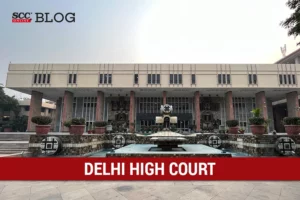Delhi High Court: In a case wherein a student had applied for a migration to another college on account of medical hardships, but the respondent-University had issued a notice imposing a complete ban on migration, Purushaindra Kumar Kaurav, J., opined that the competent authority could not be oblivious to the ground realities which might arise, and in the present case, a more pragmatic approach needed to be adopted instead of being rigid to general rule. The Court further opined that “it was incumbent upon educational institutions to make the necessary allowances to ensure that students, who were disadvantaged due to medical reasons, were also provided quality education. Therefore, the Ordinance of the Universities for self-regulation could not override a student’s right to education and the right to live a life with human dignity”.
Background
Petitioner 1 was pursing BBA from Maharaja Surajmal Institute of Technology which was located more than 30kms away from her residence. The petitioner suffered from allergic Rhinitis, associated with a group of symptoms affecting the nose, and these symptoms occur while breathing in something allergic such as dust, animal dander or pollen. It resulted in watery eyes, sneezing and dizziness. Petitioner 2 was a student of Agrasen Institute of Management Studies and to facilitate the condition of Petitioner 1, Petitioner 2 agreed for interchange of the institutions and both the petitioners, therefore, jointly applied for the same to the University.
After being unresponsive towards the application, the University issued a notification on 13-07-2022, whereby, the provision in Ordinance 7, which was related to migration of students, had been amended and a complete ban had been imposed with respect to inter and intra University migration. The petitioners submitted that cases like the present one could be treated as an exception considering the extraordinary medical reasons.
Analysis, Law, and Decision
The Court observed that the University had placed a complete ban on migration on account of the recommendations of the expert committee, and the same did not seem to be arbitrary or illegal. Although, the Court opined that there could always be exceptions depending upon the facts of an individual case, particularly in cases of medical emergencies. The Court further opined that the competent authority could not be oblivious to the ground realities which might arise, and in the present case, a more pragmatic approach needed to be adopted instead of being rigid to general rule.
The Court opined that “under Article 21-A of the Constitution, the right to free and compulsory education was provided to all children of the age of six to fourteen years. The Directive Principle of State Policy in Article 45 of the Constitution and fundamental duty under Article 51-A(k) of the Constitution also emphasized on providing education opportunities to children. Constitutionally, to provide higher education might not be an obligation of a State, under Part III of the Constitution, owing to limited resources. However, the students deserve quality higher education in considering atmosphere within available resources. Devoiding them of the same, due to medical ailments that were beyond their control, would be tantamount to doing a disservice to the future of this country”.
The Court opined that “it was incumbent upon educational institutions to make the necessary allowances to ensure that students, who were disadvantaged due to medical reasons, were also provided quality education. Therefore, the Ordinance of the Universities for self-regulation could not override a student’s right to education and the right to live a life with human dignity”.
The Court relied on Anika Jain v. University of Delhi, 2008 SCC OnLine Del 1237, wherein it was held that “although a candidate had no vested right to seek migration, however, if a student was able to disclose good reasons to seek migration, the college could not act in a whimsical manner and withhold the No Objection Certificate, such an act would constitute arbitrary exercise of power. Moreover, that the discretion vested in the college/university while considering the application for migration had to be exercised objectively and the college could not ignore the welfare of the student and the choice of the student had to be respected”.
The Court opined that since the University was the best authority to adjudge and appreciate the difficulty being faced by the petitioners directed, thus it directed the University to consider the application of the petitioners for allowing inter University migration. The Court further stated that if the Vice Chancellor of the University concluded that the petitioners’ grievance was genuine and their request was acceptable, then the same should be accepted without being influenced by the notification dated 13-07-2022.
[Tanishka v. State (NCT of Delhi), 2023 SCC OnLine Del 6105, Order dated 12-09-2023]
Advocates who appeared in this case :
For the Petitioners: Mr. Alok Kumar, Senior Advocate; Ms. Manisha A. Narain, Mr. Amit Kr. Singh, Mr. Varun Maheshwari, Mr. Manan Soni, Advocates
For the Respondents: Mr. Avishkar Singhvi, Mr. Naved Ahmed, Mr. Vivek Kr. Singh, Mr. Apoorv Kurup, Ms. Kirti Dadheech, Ms. Anita Sahani, Advocates

